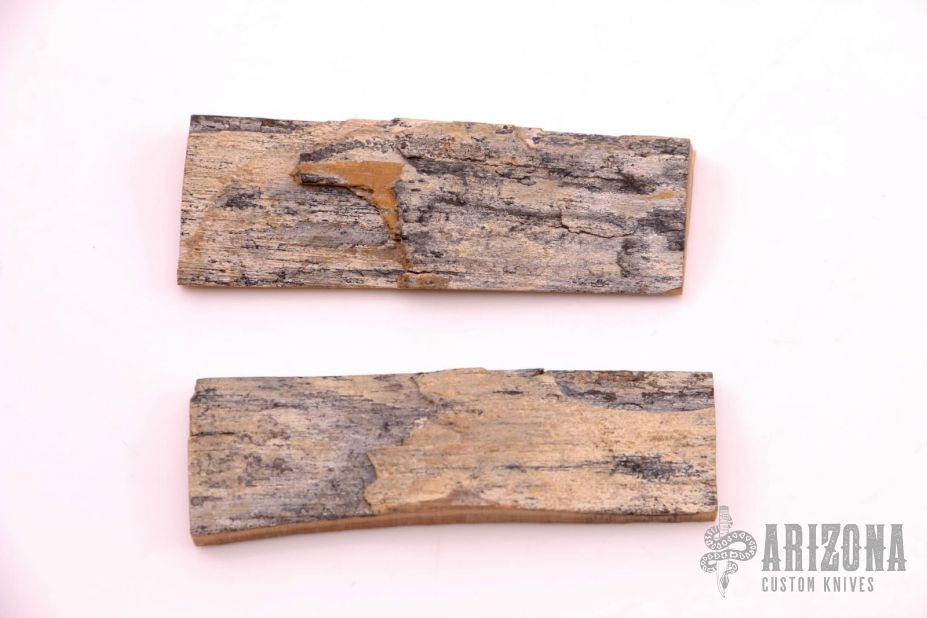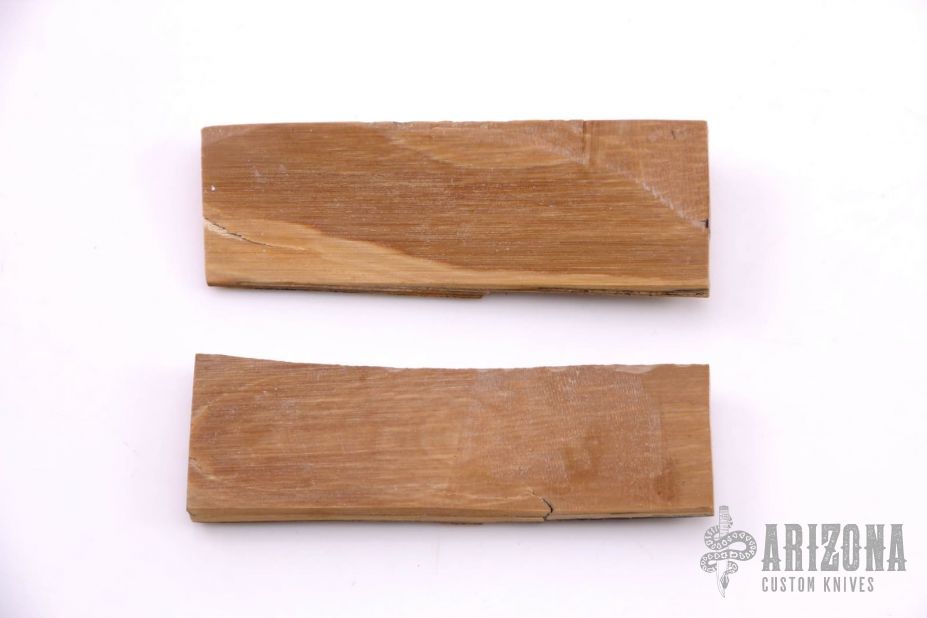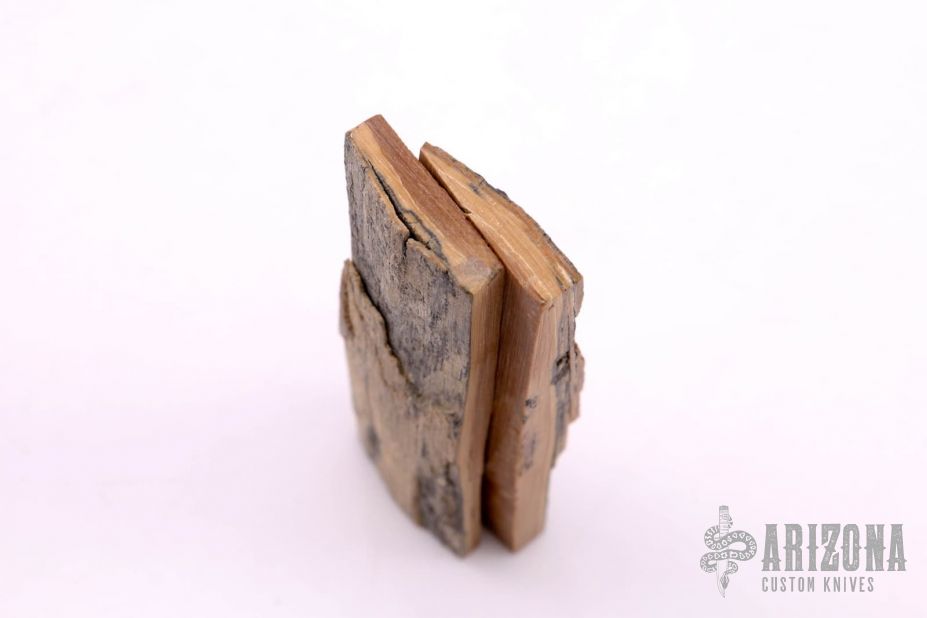Bark Fossil Mammoth Ivory Scales - Rough/Raw
Price $35.00
Product Details
Overall Length 3
Weight (oz) 1.4
Source From maker
Additional Specs
Handle Material Tusk & Tooth
About the Maker
Martin, Miles
I was 5 years old, it was 1957. Raised in the city middle class, son of a college professor. I wanted to be a mountainman since that age, and live alone in the wilds. The knife always symbolized the single most important tool one needs to survive. ?A man with a knife is master of a thousand tasks? I read somewhere. That stuck with me. The first serious tool man discovered was the cutting edge, and that changed man more then any other tool in history. Without a blade we can not even take apart game we might get or make clothes to stay warm. I built my first blade in high school shop. I always carried a blade. I built my first serious knife about 1973, in the Alaska wilderness. I used a shovel, shot out the rough shape with a 357 magnum pistol and worked it with a file. I used a moose tine as handle ? drilled the hole in the antler with a hot nail. I skinned moose with it, but was not happy.
I ordered ready made blades and put handles on them for years. I was poor and lived on my houseboat in the Alaska wilds. I learned a lot about ?materials? for handles and this was more my specialty. Out of necessity I had to fix things, build things, as I was out of touch for up to 8 months without seeing anyone. I had to combine various materials and make them strong with internal pins, wrappings etc. I had to understand what could withstand heat, water, sharp blows, internal stress. I lived with animal parts and began selling to knife makers, selling bone, antler, horn, claws, teeth, fossils, ivory etc. Living on a boat and traveling the wild I knew natives all over the state who trusted me and traded with me. I got mammoth tusks, grizzly claws and sometimes hard to get record materials the civilized world never gets to look upon. I always sold knives off and on over the years, but did not work the steel as I was just not set up for it. I thought for years it was too complicated. My first attempt in a woodstove did not work and I warped the blade. Custom blades friends made broke.
About 1989 I moved to the village of Nenana. I had electricity for the first time. I could get power tools and order things by mail. I had a shop to work in. When computers came along I was right there knowing this was how to offer my goods all over the world. I began to go to the biggest show in the world, the Tucson fossil gem show, partly because my mother lives there, but at first I confess, wanted to get rich selling my mammoth ivory.
I did not get rich, but learned a lot, and met other dealers like me who sold animal products from all over the world and I learned fast. The world of trading, wheeling and dealing, was just how it has been for me in village life. I met an African once, barefoot in a toga, and I told him bear stories. He told me lion stories and we had a lot in common. He got out his private stash of huge fossil lion fangs, big enough for knife handles. I had some record size Alaska wolf claws.
Along the way I realized I now had the tools to build my own knife blades. I work with steel, but work it hard and slow so do not do tempering. I still often buy good blades from a blade maker, and think I prefer the stories told in the handle materials best. I do my own acid etched scenes in the steel. I?m now maybe one of the experts on raw material, doing identifications for museums, restorations , appraisals, as well as doing my own art and supplying others. I have 9 buildings full of raw materials now. ?Truckloads? I have customers from all over the world come find me in Nenana Alaska on a pilgrimage to look over my materials, who are not disappointed. So I have lots to choose from when building a knife. I stopped counting my custom one of a kind art pieces at 10,00 items over 10 years ago. I?m a full time artist.
Most of my credentials were earned in the wild with no witnesses. Even so, I was written up in the New York Times, with big double page picture. A similar article in GEO over in Europe, like our National Geographic. Alaska magazine- I think 5 times. And Oh, on the cover if Ruralite, and think there was an blurb once in Gem Magazine. I forget. It?s not as important to me now as it once was. Any bullshitter can get written up. The true test of life as with the knife, is to see how it does its job.
I believe my knives are unique because I did not learn from anyone else, a school, join a union, a club, a guild, mingle with other knife makers etc. I spent many years alone in the wild developing my own style. Learning how to combine material and what their properties are. I try to mix them, bring the old ? side by side with the new. I believe much is a circle, and we are destined to repeat our past. Rushing headlong into the future, who is to say we are not greeting our past?
Some customers see me more as a shaman. Defined as ?one who walks between two worlds, but belongs in neither? I am a story teller. Knives is just one of my mediums. Many knives I make are simple and not expensive, for those who use them to skin beaver, or moose, who need a knife to be strong, keep it?s edge, and affordable to trappers and subsistence people as I am. I also make knives for collectors who want a knife unlike any other on earth. But do I understand knives? I killed a moose with a knife once, but it?s a long story (read my books) I killed more moose and bears then I can count over a 30 year period in the wilderness. I guess I know about knives and how to use them. All my art and knives come with a lifetime warranty. If the problem has to do with my workmanship I fix it for free. It is built to last 70 years.""






